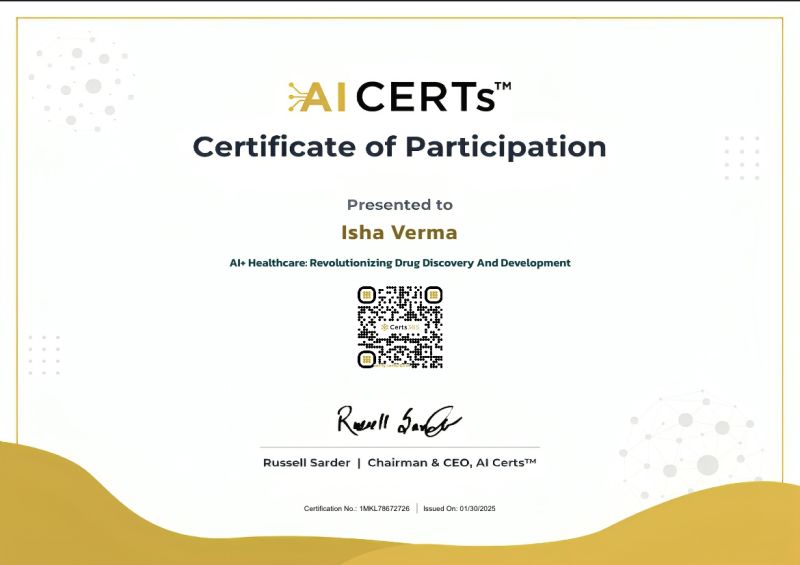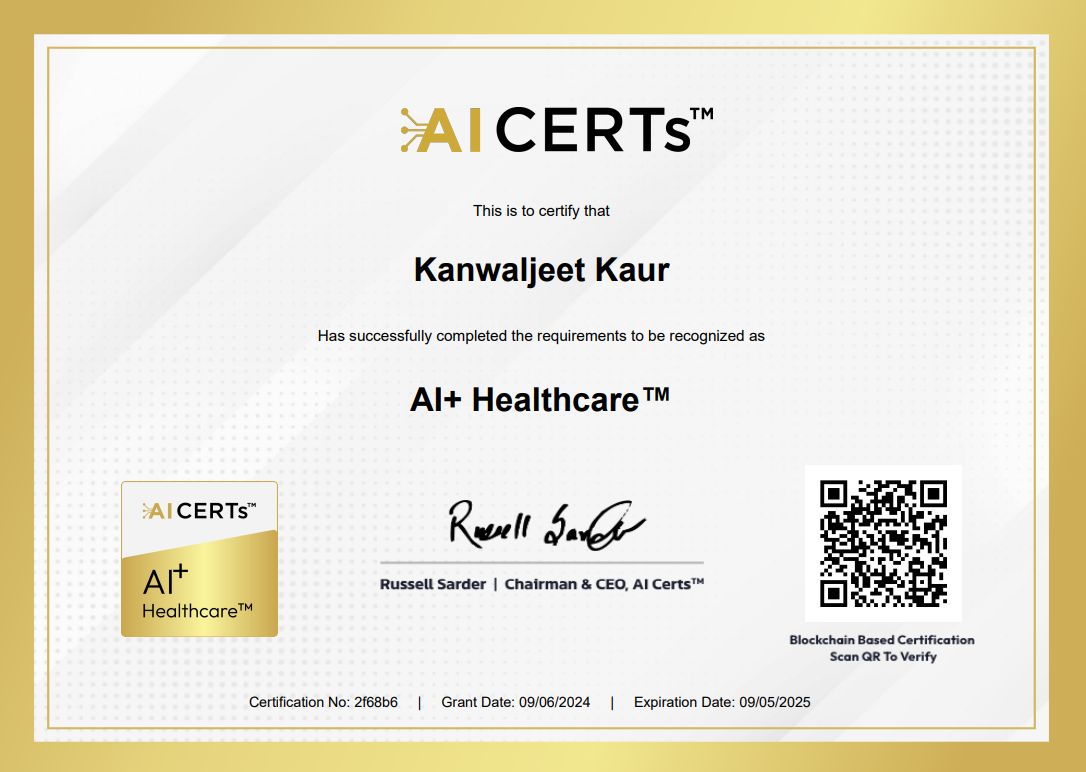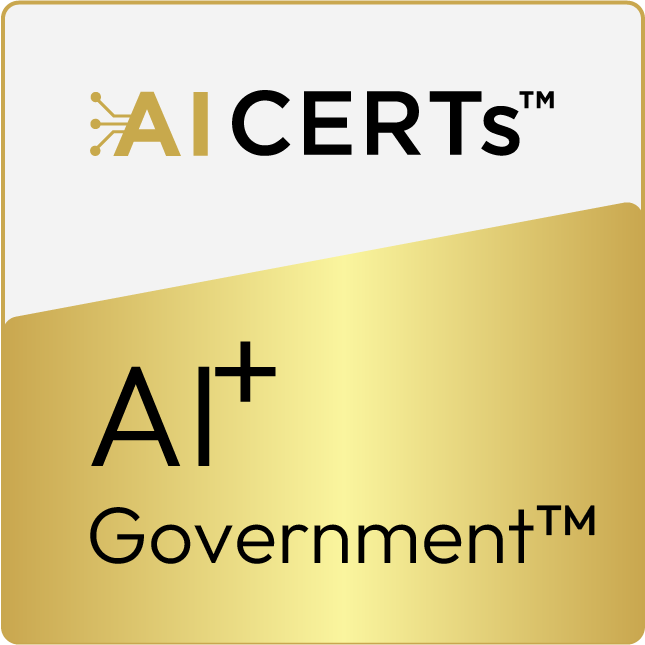AI+ Healthcare™
AP-480
Revolutionize Patient Care with Advanced AI- Healthcare Transformation: Learn how AI reshapes predictive analytics, diagnostics, and patient-centric solutions
- Comprehensive Modules: Covers ML, NLP, and ethical healthcare applications
- Practical Impact: Address real challenges like personalised medicine and operational efficiency
- Regulatory Navigation: Understand compliance and legal standards for AI in healthcare
Why This Certification Matters
At a Glance: Course + Exam Overview
- Instructor-Led: 1 day (live or virtual)
- Self-Paced: 8 hours of content

Who Should Enroll?
Healthcare Professionals: Enhance patient care through AI-driven diagnostics and decision support.
Data Scientists & Analysts: Leverage AI for health data analysis and predictive modeling.
Medical Technologists: Implement AI solutions for improved medical imaging and diagnostics.
IT Specialists & System Integrators: Optimize healthcare infrastructure with AI-powered systems.
Students & New Graduates: Gain valuable AI healthcare skills to excel in a growing industry.
Industry Growth: Empowering Healthcare Professionals with Predictive & Personalised AI Solutions
- The global AI in healthcare market is expected to grow at a CAGR of 42.2% from 2023 to 2030. (Source: Grand View Research)
- AI-powered healthcare tools are transforming industries such as healthcare services, medical research, and patient care, enhancing data processing.
- The adoption of AI-enhanced healthcare technologies is increasing, with organizations leveraging AI for predictive diagnostics, personalized medicine.
- AI-driven healthcare automation is becoming essential for hospitals and clinics, improving efficiency in patient care management and reducing operational costs.
- AI in healthcare is revolutionizing sectors like telemedicine, electronic health records (EHR), and health informatics.

Skills You’ll Gain
- AI-Powered Medical Diagnostics
- Healthcare Data Management
- Medical Imaging Enhancement with Deep Learning
- Predictive Analytics in Healthcare
- Natural Language Processing (NLP) for Healthcare
What You'll Learn
- Course Introduction
- 1.1 Fundamentals of Artificial Intelligence
- 1.2 AI in the Healthcare Ecosystem
- 1.3 Ethical and Regulatory Framework
- 2.1 Data Acquisition and Management
- 2.2 Preprocessing Techniques for Medical Data
- 2.3 Model Development and Validation
- 3.1 Introduction to Medical Imaging
- 3.2 AI Techniques in Imaging
- 3.3 Implementation and Future Trends
- 4.1 AI-powered Diagnostic Systems
- 4.2 Predictive Analytics in Healthcare
- 4.3 Challenges and Solutions
- 5.1 Customized Treatment Solutions
- 5.2 Machine Learning Models in Treatment
- 5.3 Case Studies and Ethics
- 6.1 Wearable Technologies and IoT in Healthcare
- 6.2 Remote Patient Monitoring Systems
- 6.3 Impact on Healthcare Delivery
- 7.1 AI in Health Insurance
- 7.2 Operational Efficiency in Healthcare
- 7.3 Future of AI in Health Systems
- 8.1 Innovations in AI and Their Impact on Healthcare
- 8.2 Interdisciplinary Approaches
- 8.3 Preparing for the Future
- 1. What Are AI Agents for Healthcare
- 2. Applications of AI Agents in Healthcare
- 3. Aligned Examples
Tools You’ll Master

PathAI

Viz.ai

Tempus

VirtuSense
Prerequisites
- Basic understanding of healthcare world, no technical expertise or knowledge required.
- Readiness to think innovatively, generating novel ideas, and effectively utilizing AI tools in healthcare.
- Openness to exploring various aspects of AI in healthcare, including its implications, challenges, and opportunities.
- Strong interest and motivation to delve into the integration of AI technologies within the healthcare sector.
Exam Details
Duration
90 minutes
Passing Score
70% (35/50)
Format
50 multiple-choice/multiple-response questions
Delivery Method
Online via proctored exam platform (flexible scheduling)
Exam Blueprint:
- Introduction to Artificial Intelligence (AI) in Healthcare – 10%
- Data Handling and AI Modeling – 15%
- AI in Medical Imaging – 15%
- AI in Diagnostics and Predictive Analytics – 15%
- AI in Treatment Planning and Personalized Medicine – 15%
- AI in Patient Monitoring and Care Management – 10%
- AI in Health Insurance and Healthcare Management – 10%
- Advanced Topics and Future Directions in AI+ Healthcare – 10%
Choose the Format That Fits Your Schedule
What’s Included (One-Year Subscription + All Updates):
- High-Quality Videos, E-book (PDF & Audio), and Podcasts
- AI Mentor for Personalized Guidance
- Quizzes, Assessments, and Course Resources
- Online Proctored Exam with One Free Retake
- Comprehensive Exam Study Guide
Instructor-Led (Live Virtual/Classroom)
- 1 days of intensive training with live demos
- Real-time Q&A and peer collaboration
- Led by AI Certified Trainers and delivered through Authorized Training Partners
Self-Paced Online
- 8 hours of on-demand video lessons, e-book, and podcasts
- Learn anywhere, anytime, with modular quizzes to track progress
Discover Your Ideal Role-Based Certifications and Programs!
Not sure which certifications to go for? Take our quick assessment to discover the perfect role-based certifications and programs tailored just for you.
Get CertifiedFrequently Asked Questions
Graduates can pursue roles such as AI Healthcare Specialist, Medical Data Analyst, AI Applications Developer in Healthcare, Clinical AI Consultant, and more. The certification enables professionals to lead AI initiatives that improve healthcare delivery and patient outcomes.
AI enhances healthcare operations by improving diagnostic accuracy, optimizing treatment plans through personalized medicine approaches, streamlining patient monitoring with IoT and wearable technologies, and ensuring efficient healthcare management through predictive analytics.
This certification is ideal for healthcare professionals, data scientists, AI engineers, and anyone interested in leveraging AI to innovate and improve healthcare delivery and operations.
The course equips participants with specialized skills that are highly valued in the healthcare industry, including medical data analysis, AI modeling, and ethical AI implementation. It prepares them for roles that drive innovation and improve healthcare delivery using AI technologies.
The curriculum includes modules on ethical and regulatory frameworks for AI adoption in healthcare. Participants will learn to navigate privacy concerns, data integrity issues, and ethical dilemmas associated with AI applications in patient care.







